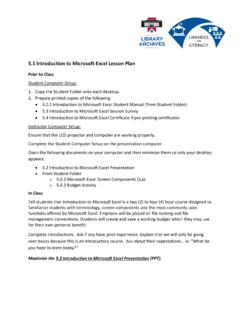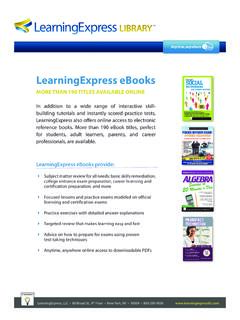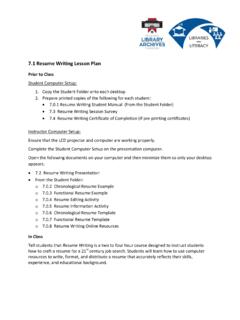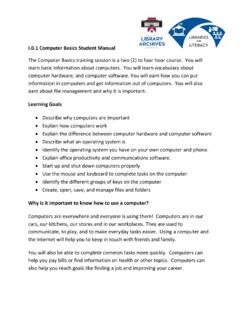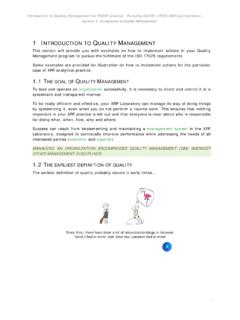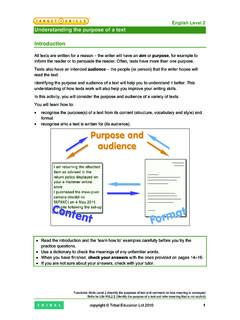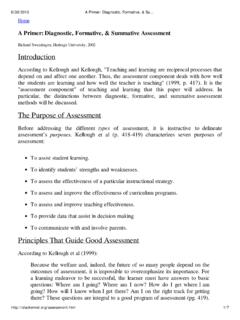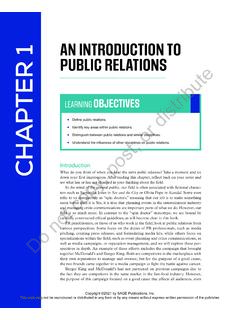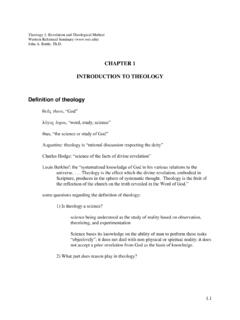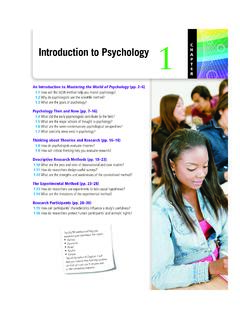Transcription of 4.0.1 Introduction to Microsoft Word Student Manual
1 Introduction to Microsoft Word Student Manual Introduction to Microsoft Word is a two (2) to four (4) hour course designed to familiarize you with the terminology, screen components and the most commonly used functions offered by Microsoft Word. Emphasis will be placed on proper document formatting techniques and file naming and file management conventions. Learning Goals: Identify the various benefits of using word processing software. Identify the main parts of the Microsoft Word window. Identify the purpose of the commands on the menu bar. Copy, cut and paste text. Work with the buttons on the toolbar. Type, edit and format text.
2 Work with pictures. Work with language tools (spell check). Open, save, save as, and print Microsoft Word files. What is Microsoft Word? Microsoft Word is the word processing component of the Microsoft Office Suite. It is used primarily to enter, edit, format, save, retrieve and print documents. Pay Special Attention to Terminology While different versions have different appearances, they all have most of the same features. If you know what to call it, you should be able to find it in other versions. Open the Cover Letter document located in your Student folder. Take notes and follow along as your instructor demonstrates common word processing functions.
3 Minimize, restore, maximize, and close buttons .. Horizontal and vertical scroll bars .. Title Bar Title Bar .. Tabs Bar .. Ribbon Components (Tab Groups). 1. File Tab .. Save .. Save As .. 2. Home Tab .. Clipboard .. Copy .. Cut .. Paste .. Font .. Face .. Size .. Type .. Style (B,I,U) .. Paragraph .. Alignment .. Bullets .. Indent .. Editing .. Find Insert Tab .. Pictures .. Shapes .. 3. Page Layout Tab .. Margins .. Orientation .. 4. References Tab .. 5. Mailings Tab .. 7. Review Tab .. Spelling & Grammar .. Word Count .. 8. View Tab .. Print Ruler .. Zoom .. Screen Components Quiz: 1. Open the Screen Components Quiz in your Student folder.
4 2. Work alone or with a partner to complete the Screen Components Quiz. Microsoft Word Terminology Alignment: refers to the position of lines in a paragraph in relation to the documents left and right margins This text is left aligned. This text is centered. This text is right aligned. This text is fully justified. It is spread evenly from the left to the right margin. All text in this paragraph will be justified between margins until you hit the enter key to force a new paragraph. Backspace: deletes data to the left of the insertion point. Bold: characters in bold appear on the screen in a higher intensity. This text is bold.
5 Bold should be used for emphasis, but like all formatting characteristics, should be used sparingly. Bullets: special characters or symbols that are used to set off a paragraph. This is item one in a bulleted list. This is item two in a bulleted list. Centering: the placement of a line of text in the center of the screen or page where the left-most and right-most characters in the line are the same distance from the left and right margins. (see alignment). Clip Art: pre-designed images that can be placed within a document. Close: closes the document and offers to save the changes you made to the document without exiting the program.
6 Copy: creates a duplicate of highlighted/selected text and saves to the clipboard to be pasted elsewhere. Cut: removes highlighted/selected text and saves to the clipboard to be pasted elsewhere. Default: A default setting is the software manufacturer's preset option for a particular command or function. Default settings can be changed. Document: another name for a file created using Microsoft Word. Font: a style of typeface, such as: Times New Roman, Arial Black, Arial, and Freestyle Script. A font is a set of all the characters available in one typeface and size, including uppercase and lowercase letters, punctuation, and numerals.
7 Font Formatting: changes the appearance of the text. Font formatting includes enhancements such as font style (bold, centering, and underline), point size (12 pt), and font typeface (Times New Roman, Arial, and Courier New). Format Painter: enables you to copy the formatting of one word or paragraph and apply it to another word or paragraph. Hard Return: You can force Word to end a paragraph and move to the next line by pressing the enter key. The resulting hidden command is called a Hard Return. I-beam Mouse Pointer: The mouse pointer turns into an I-beam mouse pointer when it is within the document area. Use the I-beam mouse pointer to place the insertion point in a document.
8 Indentation: the amount of space measured from the page margin that is applied to a paragraph or an area of a document. Insertion Point: the point at which the cursor is blinking on the document screen. Italics: Italicized characters appear on the screen slightly tilted to the right. This text is italicized. Line Spacing: refers to the number of lines used by each line of text. In single-line spacing, each line of text is followed by another line of text, and there are no blank lines in between. In double-line spacing, each line of text is followed by a blank line. Margin: The amount of blank space, usually measured in inches or characters, above and below and to the right and left of the main body of a document.
9 Paragraph: A paragraph is any amount of text separated by a hard return. Microsoft Word sees anything from a single word to an entire page of text as a paragraph. Paste: Adds previously copied or cut text at the insertion point. Print Preview: Print Preview lets you see how your document will look on the page before it is printed. Wrapping: Text automatically wraps to the next line when typing in Microsoft Word. The only time you need to hit the enter key is when you want to start a new paragraph.

